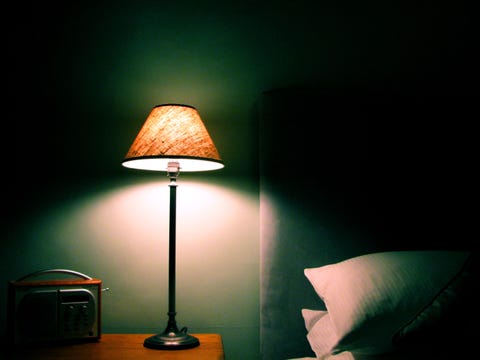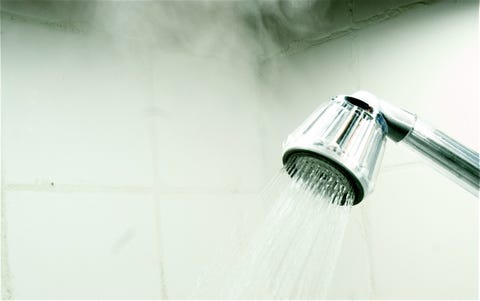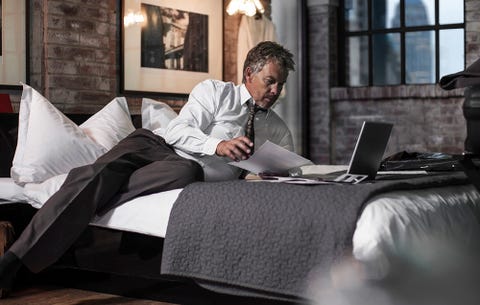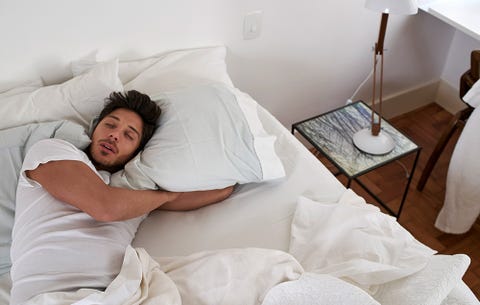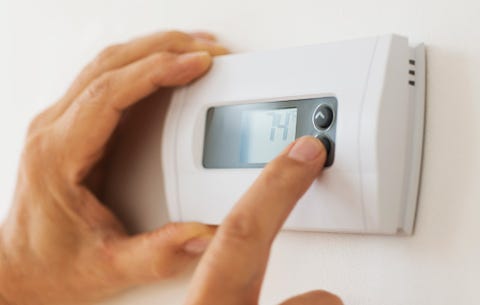Although some guys fall asleep the second their heads hit the pillow, many restlessly stare at the ceiling for hours.
Those who toss and turn each night know how frustrating it is to have trouble falling asleep. But aside from making you tired and cranky, not sleeping enough is bad for your health, too. Research has shown you may be at a higher risk of weight gain, diabetes, and depression when your circadian rhythm is thrown out of whack.
“Inadequate sleep and poor quality sleep will affect every organ system,” says Men’s Health sleep advisor William Winter, M.D., author of The Sleep Solution: Why Your Sleep Is Broken and How To Fix It.
“Poor sleep makes us want to eat more and eat bad things, it affects digestion, cardiac functioning, hypertension risk, diabetes risk, [and] immune system functioning,” he adds.
That’s why we rounded up tips from sleep experts, scientific research, and users on r/AskReddit to help you fall asleep faster and avoid another sleepless night.
Try some of these tips, and maybe you’ll find yourself conking out quickly tonight.
Change Your Lighting
Getty Images
From the lamps in your bedroom to the glow of your electronic devices, lighting affects your ability to sleep. The melatonin hormone helps regulate your sleep-wake cycle and your exposure to light controls those hormone levels. When it’s time to hit the hay, darkness is key. It might seem like the light from your phone or TV isn’t messing with your ability to catch some rest, but it is. You should avoid looking at any bright screens up to two hours before you’re hoping to fall asleep. It might be worth considering switching out your light bulbs. Smart bulbs like the Philips Hue line take these factors into account and can be customized to your needs to not impact your ability to fall asleep or fall back asleep if you happen to wake up in the middle of the night. If you need to turn on a light in the middle of the night, dimmer is better.
Shower at night
Getty Images
You might want to rethink your daily routine if you’re a morning shower person. There’s evidence that cleaning yourself off at the end of the day can actually help you sleep better. The key is to time it correctly. Showering immediately before bed is actually not a good thing because the hot water raises your body temperature. Allowing your body to cool down before tucking yourself in for the night is the best way to do it. So grab your go-to soap of choice and hit the shower if you’re looking to get a good night’s rest.
Try CBD
Getty Images
The recent rise of CBD (cannabidiol) might seem like just another homeopathic trend, but its therapeutic properties shouldn’t be ignored if you have sleep issues. Used to treat anxiety, the calming effect obtained from an appropriate dosage of CBD might be just the trick you’re looking for. According to studies, cannabidiol targets a person’s endocannabinoid system to address the factors that cause insomnia rather than working as a sedative. Essentially, it can help you fall asleep without making you drowsy.
Drink some milk.
Getty Images
Your grandma knew what she was doing when she’d heat you up a glass of warm milk before bed.
“Milk contains the protein α-lactalbumin. This protein contains high amounts of the amino acid tryptophan, which produces melatonin, the hormone that induces sleep,” says Dr. Winter.
Studies show that diets rich in tryptophan (including egg whites and pumpkin seeds) help improve sleep. And an added bonus: “Milk’s calcium also benefits tryptophan’s absorption into the brain,” says Dr. Winter.
Stop using a sleep tracker.
Getty Images
About 10 percent of the American population wears a fitness or sleep tracker on a regular basis, which can allow them to find out what exactly is going on when they’re zonked out.
That should be good for your sleep, right? Well, not exactly. According to a study published in the Journal of Clinical Sleep Medicine, those who tracked their sleep went to bed feeling pressure to attain an adequate amount of sleep — and reported increased levels of self-induced anxiety. As a result, they may have been making their inability to fall asleep even worse.
The researchers dubbed this “orthosomnia,” or the preoccupation or concern with perfecting or improving their sleep data.
Practice guided meditation
Stressed out about your inability to sleep? Meditation has been shown to reduce cortisol levels, helping you feel less anxious and more relaxed — and thus, more likely to fall asleep. A 2015 study in JAMA found that mindfulness mediation helped improve sleep quality in older adults by reducing “worry, rumination, and mood disturbances.”
Try an app or other mediation product to help you get started. Dr. Winter recommends Muse, which allows people to practice using meditation to fall asleep faster.
“I listen to guided mediation sessions on YouTube every night,” says Redditor brigie3594. “It’s gotten to the point where sometimes I won’t even hear the end of their introduction I fall asleep that quickly.”
You can also try an app to help you get started. Dr. Winter recommends Muse, which allows people to practice using meditation to fall asleep faster.
Make your bed a place for sleep.
Getty Images
If you’ve ever found yourself laying in bed unable to sleep, you’ve experience what researchers call “conditioned arousal,” which is caused by doing things in bed that have trained your brain to keep you awake rather than fall asleep—like checking work email on your phone.
“It’s amazing how many people tell me that they go to bed around 9 pm every night and it takes them two hours to fall asleep,” says Dr. Winter.
So keep your bed a sleeping-only zone.
“I never lay in my bed unless I’m sleeping,” says redditor Fibrizzo. “Trains the brain to shut down faster instead of prompting you to grab your phone or a book to kill time.”
Adds jimcdon2: “Set the space for sleep: Turn off all screens at least an hour before bed, turn down all lights. After getting in bed, completely relax the body.”
Learn how to really rest.
Getty Images
If you’re unable to sleep, don’t panic — as long as you’re relatively relaxed, you’ll be reaping many of the same benefits. “The benefits of resting rival those of sleep, and in some cases are cognitively indistinguishable,” says Dr. Winter.
A 2008 study funded by the National Institute of Mental Health on the effects of lying in bed with your eyes closed found that when resting, some of your brain’s neurons turn off, mimicking what happens in sleep. And according to the National Sleep Foundation, resting can “also reduce stress, improve your mood, and increase alertness, mental clarity, creativity, and motivation.”
Still, resting isn’t going to give you the full benefits of real sleep, including cognitive restoration, increased memory abilities, and hormone regulation. Sleep is the best option for true restoration of the mind and body, but if it remains elusive, you can calm your panicking mind by telling yourself even just resting is giving your brain a break.
“Just start thinking the way you would in a dream,” says Redditor zamowasu. “You don’t have to let your mind wander completely. Think of something ridiculous and let yourself go down that road.”
Crank up the air conditioning
Getty Images
Studies have shown that sleeping in cooler temps is best for sleep. For optimal benefits, set your thermostat between 60t to 68 degrees Fahrenheit.
This helps decrease your body’s core temperature, triggering a process that initiates sleep. Another option: bed-cooling products. “Try a product like a ChiliPad on your bed for sleep,” says Dr. Winter.
Try the blinking trick
This one is more rooted in anecdotal evidence than anything else, but some redditors swear by it. From kha1id: “Blink for a solid minute without stopping your eye lids will get heavy and fall.”
Source: Read Full Article
